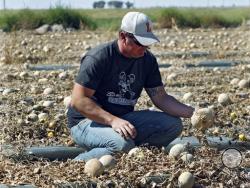Farmers arrested in fatal listeria outbreak
Posted: September 27, 2013 - 4:20am
DENVER (AP) -- The owners of a Colorado cantaloupe farm were arrested Thursday on charges stemming from a 2011 listeria epidemic that killed 33 people in one of the nation's deadliest outbreaks of foodborne illness.
Federal prosecutors said brothers Eric and Ryan Jensen were arrested on misdemeanor charges of introducing adulterated food into interstate commerce. Each man faces six counts.
Prosecutors said the federal Food and Drug Administration and the Centers for Disease Control and Prevention determined the Jensens didn't adequately clean the cantaloupe.
Criminal charges in food poisoning cases are rare, said attorney William Marler, who represents many of the listeria victims in civil cases. Only four other people have faced such charges in the past decade, he said.
Marler noted that felony charges would have required prosecutors to show the contamination was intentional.
"The real significance of the case against the Jensens is they are being charged with misdemeanors, which do not require intent, just the fact that they shipped contaminated food using interstate commerce," he said.
The FDA has said the melons likely were contaminated in Jensen Farms' packing house. It concluded that dirty water on a floor, and old, hard-to-clean equipment probably were to blame.
The epidemic was the deadliest outbreak of foodborne illness in 25 years, and it delivered a serious blow to Colorado cantaloupe farmers. The CDC said people living in 28 states consumed the contaminated fruit.
A number of lawsuits were filed by people who were sickened or who had a family member die after the outbreak.
Eric Jensen, 37, and Ryan Jensen, 33, could face up to six years in prison and up to $1.5 million in fines each if they are convicted of all counts against them, prosecutors said.
The Jensens' farm in southeastern Colorado filed for bankruptcy after the outbreak.
The FDA said Jensen Farms had bought the used processing equipment just before the outbreak, and it was corroded, dirty and hard to clean. The packing facility floors were also constructed so they were hard to clean, so pools of water potentially harboring the bacteria formed close to the packing equipment, according to the FDA.
The dirty equipment previously was used to wash and dry potatoes, the agency said, and the listeria could have been introduced as a result of its past use.
The FDA said the way the cantaloupes were cooled after being picked may have exacerbated the listeria growth, and that another possible source of contamination was a truck that frequently hauled cantaloupe to a cattle operation and was parked near the packing house.
The outbreak was a setback for farms in Colorado's revered Rocky Ford cantaloupe region, where hot, sunny days and cold nights produce fruit known for its distinct sweetness.
Jensen Farms was about 90 miles away from Rocky Ford, but the Jensens used the Rocky Ford name, and sales dropped across the region. Later, Rocky Ford farmers registered Rocky Ford Cantaloupe as a trademark, hired a full-time food safety manager and built a central packing operation where melons are washed and rinsed.
Tammie Palmer, whose husband, Charles, became ill after eating the cantaloupe and died this year, said the criminal case won't help her.
"My husband is already dead," said Palmer, of Colorado Springs.
She said a just outcome would be some way of preventing the Jensens from farming again or having any involvement with the food industry.
Palmer and her husband filed a lawsuit seeking $2 million from Jensen Farms but it hasn't been resolved.
"I was hoping everything would be settled and I could do something with my husband, but that's not going to happen," she said.

